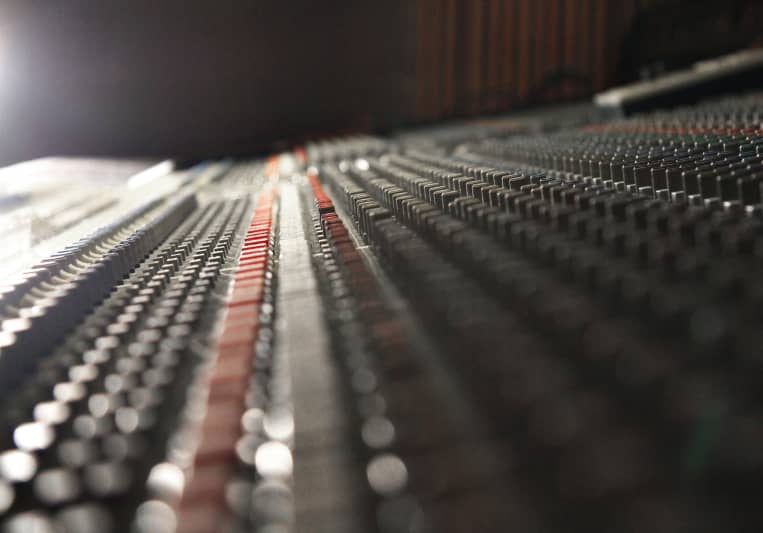
Tanglewild Studio is devoted to delivering beautiful soundscapes for both music and film using a combination of our experience, and close collaboration with our clients, to ensure the final product is the best it can be.
We offer a wide variety of services in audio post production, including audio repair/editing and mixing for music, film, and broadcast.
Send me a note through the contact button above.
Interview with Tanglewild Studio
Q: What advice do you have for a customer looking to hire a provider like you?
A: Don't be afraid to communicate a deadline. The sooner we know, the sooner we can plan and discuss options for a project!
Q: If you were on a desert island and could take just 5 pieces of gear, what would they be?
A: A pen, paper, a neve sound board, a microphone, and a Limiter.
Q: What was your career path? How long have you been doing this?
A: My career path is of course, forever ongoing. I have taken an auto-didactic approach to audio production, and have been working as an audio engineer for 6 years.
Q: How would you describe your style?
A: I would describe my style as objective. I like to have a reason for the choices I make in a project.
Q: Which artist would you like to work with and why?
A: It would be a pleasure to work with an artist such as Hans Zimmer or Thomas Newman, as they have very creative scores that fit the mood of the movies that work with. I would love to work with a Stargate television series or Starwars film as I am a great lover of science fiction.
Q: What's your strongest skill?
A: The studio’s strongest attribute would be our ability to work with our customers. Nothing will ever be more important than an artist’s vision shining through for the final product.
Q: What's your typical work process?
A: The process for a typical project is as follows: 1. Define the volume hierarchy of the project (what is the most and least important element)? 2. Process each sound individually using an algorithm developed by Tanglewild Studio. 3. Then mix the sounds together using a divide and conquer strategy to ensure all sounds are heard clearly. 4. Master the track or production to ensure that it meets the industry standard loudness.
Q: Describe the most common type of work you do for your clients.
A: I have had the privilege of working with many at-home artists that take a DIY approach to their recording process.
Q: Tell us about a project you worked on you are especially proud of and why. What was your role?
A: I am especially proud of working with Majora on their “Obsidian” release as a mastering engineer. I had been hoping for a long while to work with them, and finally the opportunity arose!
Q: What are you working on at the moment?
A: Tanglewild is always working to improve our production process.
Q: Is there anyone on SoundBetter you know and would recommend to your clients?
A: I am not familiar with too many in the soundbetter communinty, but I look forward to changing that!
Q: Analog or digital and why?
A: I prefer digital. The algorithms Tanglewild uses do not permit the use of analog equipment.
Q: What's your 'promise' to your clients?
A: I promise to continue working with my customers until they are completely satisfied with the final product of their project.
Q: What do you like most about your job?
A: I thoroughly enjoy seeing how artists assembled their creations.
Q: What questions do customers most commonly ask you? What's your answer?
A: A commonly asked question would be, “How long does it take for a project to finish?”. The answer is that the first draft usually will require 3 days. Iterations, depending on how complex they are, can be a 1-2 days turnaround time.
Q: What's the biggest misconception about what you do?
A: A misconception about what I do would be that a draft of a product will be perfect on the first try. We instead provide a draft, and then iterations of that draft with edits from the client, until they are satisfied.
Q: What questions do you ask prospective clients?
A: A question I like to ask prospective clients is “What do you want the end result to accomplish?”
Q: Can you share one music production tip?
A: Always make sure that there is always something interesting for a consumer to listen to and focus on in a piece of music or film soundscape.
Q: What type of music do you usually work on?
A: The projects we work on usually have been artists who have taken a DIY approach to writing, arranging, and recording.
Q: What do you bring to a song?
A: Tanglewild strives to deliver uncompromising clarity and definition to any project.
Q: Tell us about your studio setup.
A: My approach to music production takes place in the box, with software developed almost exclusively from iZotope or Waves audio.
Q: What other musicians or music production professionals inspire you?
A: I have always been inspired by the work of Abbey Road Studio and Skywalker Sound.

I was the Mixing and Mastering Engineer in this production
- EditingAverage price - $50 per track
- Mixing EngineerAverage price - $50 per song
- Post EditingContact for pricing
- Post MixingContact for pricing
- Production Sound MixerContact for pricing
- Podcast Editing & MasteringAverage price - $100 per podcast
- Mastering EngineerAverage price - $30 per song
For Musicians:
We offer one song before payment is due. 50% due before work starts and the rest of the release.
For Filmmakers:
We offer 3 minutes of audio before requesting payment.
- Monuments
- Thomas Newman
- iZotope Ozone Suite
- Waves Plugins
Unlimited Revisions and Changes



